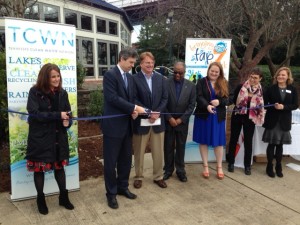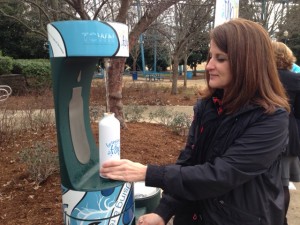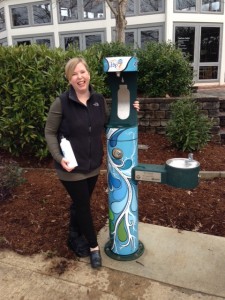TCWN and Chattanooga Officials Dedicate New Coolidge Park Water Bottle Refill Station
One of nine stations in the Chattanooga Area
February 23, 2016
FOR IMMEDIATE RELEASE
TCWN and Chattanooga Officials Dedicate New Coolidge Park Water Bottle Refill Station
Feb. 22, 2016 - Chattanooga Mayor Andy Berke and Tennessee Clean Water Network Executive Director Renee Hoyos cut a ribbon today to dedicate the new TCWN water bottle Refill Station in Coolidge Park near the Carousel Building.
“This is one of nine water bottle refill stations that TCWN has installed in the Chattanooga area,” said Hoyos. “These fountains are part of the TCWN’s Bringing Tap Back Project that is installing water bottle refill stations in cities across Tennessee.”
“The Bringing Tap Back Project is an effort to encourage citizens to drink more tap water and less sugary beverages in an attempt to reduce the high rates of obesity and diabetes in the Volunteer state. It also encourages people to use refillable bottles to reduce the number of plastic water bottles in our waste streams,” Hoyos said.
“It is great to partner with Chattanooga in installing these stations in parks and in community centers across the city. Chattanooga is well-known for its commitment to wellness and outdoor activities, so it was a natural fit for our Bringing Tap Back Project. I appreciate Mayor Berke being here today to dedicate this and all the other stations in the Chattanooga area,” Hoyos said.
The TCWN water bottle refill stations in the Chattanooga area include:
- Carver Youth and Family Center
- Avondale Youth and Family Center
- Eastdale Youth and Family Center
- Coolidge Park
- Warner Park
- East Lake Youth and Family Center
- South Chattanooga Youth and Family Center
- Ross’s Landing - Chattanooga Pier
- University of Tennessee at Chattanooga
Hoyos said that the Bringing Tap Back Project is being funded by a grant from the Project Diabetes Initiative of the Tennessee Department of Health. “Tennessee’s adult obesity rate is the second highest among all the states and the diabetes rank is 14th among the states. Bringing Tap Back is one way to help change those rankings and help stop the health problems caused by these chronic diseases.”
“TCWN has installed water bottle refill stations in Johnson City, Knoxville, Chattanooga, Jackson and Memphis with more cities to come in the program. The goal is to provide drinking water for people who are active outdoor and at recreational centers,” Hoyos added.
Kimberly Pettigrew, TCWN’s Community Health Programs Director, said that the Footprint Foundation contributed funding to double the number of water bottle refill stations installed in the Chattanooga area. “TCWN thanks the Footprint Foundation for their help in expanding the water bottle refill station program in Chattanooga.”
“The Footprint Foundation also covered the cost of the artist wraps that cover each of the stations. In addition to improving public health, the water bottle refill stations are pieces of public art that improve the visual landscape where they are installed,” Pettigrew added.
Pettigrew said the Chattanooga Public Arts Committee coordinated the design work for the water bottle refill station artist wraps. Chattanooga-area artists Eric Finley, Ali Kay and April Cox designed the artist wraps.
TCWN is a 501(c)(3) not for profit corporation that empowers Tennesseans to exercise their right to clean water and healthy communities by fostering civic engagement, building partnerships and, when necessary, enforcing water policy for a sustainable future. The organization goals are to advocate for strong policies and programs that result in more effective protection of Tennessee waters, to ensure meaningful and engaged public participation in the protection of our state’s waters, and to address community concerns about water quality and how it impacts health and quality of life.
-30-
On the left: Lisa Flint, Footprint Foundation Executive Director, fills her TCWN water bottle at the dedication ceremony. To the right, Chattanooga-area artist April Cox designed the wrap for the Coolidge Park station.
About TCWN:
Tennessee Clean Water Network is a nonprofit organization created to advocate for strong policies and programs that result in more effective protection and restoration of Tennessee’s waters and to educate organizations, decision-makers and the public about important water resource issues. Visit TCWN’s website at www.tcwn.org for more information on TCWN’s programs and policies to improve water quality in the state.
###
###


